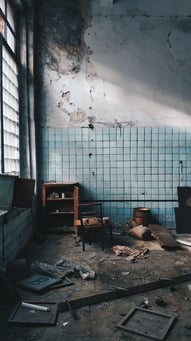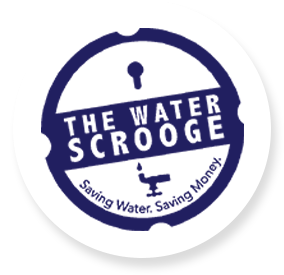
Water damage to a residential property is terrible news to the landlord and the tenant. More than almost any other situation, water damage can be insidious. Water can seep into areas and cause significant damage long before it is noticed. It can mean the devaluing of the property, expensive repairs, and possible health issues for the tenant. But who is actually responsible for fixing and, more to the point, paying for the damage?
Related: 5 Ugly Facts About Water Leaks in Apartment Buildings
What is Water Damage?
Before we discuss responsibility, let's first look at what constitutes water damage. Water damage is any damage sustained as a result of out-of-control water. It can range from minor damage requiring time to air out to much more significant damage to the very structure of your property. The major effects of water damage include the following:
Mold
The first thing we think of when discussing water damage is mold, mildew, and other bacterial growth. This is for good reason. Mold begins to develop within 24 hours of a leak or sitting water. It can spread quickly, releasing spores into the air.
More than the unsightly appearance and smell of mold, it can represent serious health risks to your tenants on the property:
- Respiratory Illnesses, including asthma and difficulty breathing
- Respiratory Infections
- Allergies
- Skin Irritations
- Frequent Headaches
Once it begins to grow, mold can be challenging to fully rid the property of its presence.
Structural Damage
Water damage can eventually ruin your property, rendering it inhabitable. Unchecked water flow will eventually cause cracks, damp, and discoloration in walls, ceilings, and foundations. Once absorbed by wood floors, it will make the wood swell and rot. Structural damage can be extensive and expensive to repair.
Electrical Damage
Unchecked water can damage your property's electrical wiring. It can cause shocks, power outages, short circuits that can ruin appliances, and electrical fires.
Pest Infestation
The moisture from some types of water damage can attract rodents and bugs to the property. Even cracks and structural damage can become home to insects that multiply quickly.
One of the biggest concerns about water damage is that it creates chain reactions to other kinds of ruin and unfavorable situations that affect the value and rentability of your property.
Related: Water Conservation Ways: Prevent and Fix Leaky Toilets
Are you a landlord concerned about water damage? Visit us to see how you can detect leaks in your property long before there's damage. Check out The Water Scrooge today!
Sources of Water Damage
Water damage can happen in many ways:
Flooding
Natural disasters like floods or excessive rain, malfunctioning appliances like leaks from dishwashers, washing machines, or refrigerators, and overflowing sinks can cause sitting water conditions on the property. Fortunately, this source of water damage is easily seen and can be dealt with immediately.
Leaks
Unlike flooding, leaks are damage sources that can be subtle and go unnoticed until late in the game. There may be faulty plumbing fixtures, a damaged roof, or broken seals on windows or doors. Any of these or other similar situations can cause leaks to happen in places and cause damage before you or your tenants are aware of it. Some leaks can be prevented with regular plumbing maintenance, but others are unavoidable.
Humidity
Believe it or not, even high humidity can cause water damage to your property. The excess moisture and condensation can be the ideal environment for mold and mildew development. It can also cause the paint on the walls and ceilings to peel or bubble, and humidity can draw pests.
Who is Responsible for Water Damage?
Now that we're clear on what water damage is and some of the primary sources of it, who is responsible for it - tenant or landlord? While laws may vary slightly from state to state, here is an overview of you and your tenant's responsibilities.
The Landlord
It is your responsibility to ensure that your property is safe and habitable. You must maintain the property's structure, which includes the electrical wiring, plumbing, and the exterior building - walls, roof, ceilings, gutters, pipes, drains, etc. This means ensuring that all of these are well-functioning and in optimal condition. You can stay ahead of possible water damage by doing this.
In addition to maintenance during a current tenancy, you can consider doing thorough maintenance checks between tenancies.
If a fault or leak is found and reported to you, you are responsible for initiating immediate measures to fix it. If you don't do this in a reasonable time, your tenant has the right to withhold the rent and use the money to resolve the issue.
Your tenant may also have the right to move out of substandard living conditions or if the repairs cost more than a month's rent.
Whether or not you are also responsible for damage to the tenant's personal property may depend on the state where your property is located.
The Tenant
While the 'big' responsibilities are those of the landlord, your tenants also have responsibilities. They must ensure that none of their belongings, including pets or appliances like washing machines, cause damage to the property. They are likely responsible if water damage occurs because of their property or pets.
Similarly, if the water damage results from your tenants' neglectful or malicious actions, they are responsible for the damage. This includes not informing you of a problem promptly. You may only realize that the issue results from the tenant's actions once it is being repaired - for instance, flushing things down the toilet that aren't meant to be flushed or allowing stuff down the drains that cause blockages.
If there is a leak or other water issue, your tenant must ensure the safety of their personal property as best they can.
Additionally, after your tenant discovers a problem, they should try to minimize the damage if they can. That means shutting off water valves, drying up standing water, etc.
Related: Property Owners: Identify and Fix Water Leaks Once and For All
Create a Cooperative Relationship with Your Tenants
For the sake of your property, create cooperative relationships with your tenants. So that if there is a problem, they will be quick to inform you. Your care of the property should be evident, and if a problem occurs, your response should be immediate.
Are you a landlord looking for a way to detect leaks early and efficiently? Our Toilet Leak Prevention Valve is what you've been looking for. Visit The Water Scrooge today!

